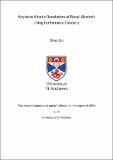Acylative kinetic resolution of biaryl alcohols using isothiourea catalysis
Abstract
This project aims to develop the first isothiourea-catalyzed acylative kinetic resolution (KR)
of biaryl diols. To place this work in context, a brief introduction to chirality and its
importance, an overview of methods for isolating enantiopure compounds, as well as an
introduction to, and theories behind, KR is given in the Chapter 1. This chapter finishes by
summarising previous publications concerning the KR of biaryl compounds and the use of
isothiourea catalysts. Chapter 2 details the optimization of the model KR of (±)-BINOL, which
includes screenings 3 isothiourea catalysts, 10 bench-stable solvents, 21 anhydrides as acyl
donors, 3 catalyst loadings and 4 different temperatures to deliver optimal selectivity. The
optimized conditions for the KR of BINOL was found to be: BTM (1 mol%); 2,2-diphenylacetic
pivalic anhydride (0.55 equiv.); room temperature for 18 hours, giving high selectivity (S = 55)
at 50% conversion while minimizing the formation of an unwanted diacylated side-product.
The scope and limitation of this procedure were evaluated in Chapter 3, which details the
synthesis and attempted KR of 13 biaryl compounds aimed to test the generality of the
procedure established in Chapter 2 (Scheme 1). It was found that the selectivity of the KR is
sensitive to the steric bulk and/or electronic property of the substituents on the biaryl rings.
While 6/6’- and 7,7’- substitution on BINOL are well-tolerated, as well as the 4/4’, 5/5’ and
6/6’-substitution on 2,2’-biphenol, substrates bearing 3/3’-substitution could not be
tolerated by this procedure. The successful KR of N-Boc-NOBIN and unsuccessful KR of
mono-O-protected BINOL derivatives, suggests that two H-bond donors are required within
the substrate to have good selectivity and reactivity in acylative KR. A proposed catalytic
cycle, as well as a simple stereochemical model that can be used to rationalise the observed
sense of asymmetric induction, is discussed in Chapter 4.
Type
Thesis, MPhil Master of Philosophy
Collections
Items in the St Andrews Research Repository are protected by copyright, with all rights reserved, unless otherwise indicated.

